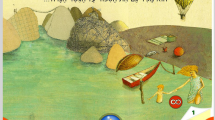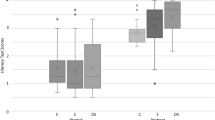Abstract
This study investigated the effects of using an interactive e-story for early literacy instruction on word recognition, story comprehension and story application. The study was conducted in two classrooms in the southern border provinces of Thailand with ethnic minority children at the kindergarten level. The samples consisted of 60 children who used the Pattani Malay language as a mother tongue, and who had little experience with Thai, the language of instruction in the kindergarten classrooms. The experimental classroom had 30 children who learned with the interactive e- story. The control classroom had 30 children who learned with the paper version of the e-story. Both groups were taught using a whole language approach for 45 min per day over 8 weeks. This research used a pretest-posttest design on word recognition and story application, and only a posttest design on story comprehension. The results showed the positive effects of using an interactive e- story and present an alternative method to foster the early literacy learning of ethnic minority children. These results showed the children’s improvement after using interactive e-story and a significant difference in word recognition and story application. The comparison of the early literacy improvement between two groups revealed a significant difference in word recognition and story comprehension but no significant difference in story application. Implications for future study and education are discussed.







Similar content being viewed by others
Explore related subjects
Discover the latest articles, news and stories from top researchers in related subjects.References
Ahmed, T. (2010). A critical appraisal of EU governance for the protection of minority right. International Journal on Minority and Group Rights, 17(2), 265–285. doi:10.1163/157181110X495890.
August, D., & Shanahan, T. (2006). Executive summary developing literacy in second-language learners: Report of the national literacy panel on language-minority children and youth. New Jersey: Lawrence Erlbaum Associates, Inc.
Basic Education Commission. (2010). The evaluation of applying bilingual (Thai and Malayu) in teaching and learning project for the Lowest Southern Part of Thailand Report. Bangkok: The teachers’ council of Thailand Press. Published in Thai.
Cacikova, M., Londakova, D., Podhradsky P., & Londak, J. (2010). Application of multimedia technologies in pre-school and elementary school language education. Proceedings from International conference “ICT for Language Learning”, 3rd edn. Florence.
De Jong, M. T., & Bus, A. G. (2003). How well suited are electronic books to supporting literacy? Journal of Early Childhood Literacy, 3, 147–164. doi:10.1177/14687984030032002.
Edelsky, C., Altwerger, B., & Flores, B. (1991). Whole language: What’s the difference? Portsmouth: Heinemann Educational Books, Inc.
Ertem, I. S. (2010). The effect of electronic storybooks on struggling fourth-graders’ reading comprehension. The Turkish Online Journal of Educational Technology, 9(4), 140–155.
Fluckiger, B. (2010). Culture-switching in different worlds: young children’s transition experiences. Australasian Journal of Early Childhood, 35(4), 101–108.
Fortune, T. W. & Tedick, D. J. (2003). What parents want to know about foreign language immersion programs. Resource document. ERIC Digest. http://www.cal.org/resources/digest/digest_pdfs/0304fortune.pdf. Accessed 8 November 2013.
Goodman, K., Bird, L. B., & Goodman. (1991). The whole language catalog. Santa Rosa: American School Publishers.
Harley, T. (2008). The psychology of language: From data to theory. New York: East Sussex Psychology Press.
Justice, L. M., & Pence, K. L. (2005). Scaffolding with storybooks: A guide for enhancing young’ children’s language and literacy achievement. Newark: The International Reading Association, Inc.
Kannaovakun, P., Chotikakamthorn, M., Sa-idi, A., Chanhom, R., Paramal, W., & Anakasiri, S. (2010). Model for the development of bilingual communicative competence of students in the three southern border provinces of Thailand. Songklanakarin Journal of Social Sciences and Humanities, 16(6), 933–952. published in Thai.
Kasten, W. K., Lolli, E. M., & Wilt, J. V. (1998). Common roots and threads: developmentally appropriate practice, whole language, and continuous progress. Literacy Teaching and Learning, 3(2), 19–40.
Korat, O. (2001). Cultural pedagogy and bridges to literacy: home and kindergarten. Early Childhood Education Journal, 28, 225–230.
Korat, O. (2010). Reading electronic books as a support for vocabulary, story comprehension and word reading in kindergarten and first grade. Computer & Education, 55, 24–31. doi:10.1016/j.compedu.2009.11.014.
Korat, O., & Shamir, A. (2006). How to select CD-ROM storybooks for young children: the teacher’s role. The Reading Teacher, 59(6), 532–543. doi:10.1598/RT.59.6.3.
Lee, J. Ch. (2013). Wii remote projects. Resource document. Wiimote Project. http://johnnylee.net/projects/wii/ Accessed 1 November 2013.
Ling, P. (2012). The “whole language” theory and its application to the teaching of English reading. English Language Teaching, 5(3), 147–152. doi:10.5539/elt.v5n3p147.
Mekheimer, M. A. A. G. (2011). The impact of using videos on whole language learning in EFL context. Arab World English Journal, 2(2), 5–39.
Moody, A. K. (2010). Using electronic books in the classroom to enhance emergent literacy skills in young children. Journal of Literacy and Technology, 11(4), 22–52.
National Center for Family Literacy. (2009). An introductory teacher guide for early language and emergent literacy instruction. Resource document. National Center for Family Literacy. http://www.famlit.org/pdf/what-works.pdf. Accessed 12 February 2013.
Phadung, M., Suksakulchai, S., & Kaewprapan, W. (2012a) States of learning experiences for preschool children using Thai as a second language and tendency of bilingual multimedia development: A case study of three southern border provinces of Thailand. Proceedings from International Conference on Management and Education Innovation. Kuala Lumpur.
Phadung, M., Suksakulchai, S., & Kaewprapan, W. (2012b). The design framework of interactive storybook support early literacy learning for ethnic minority children. Proceedings from the World Congress on Engineering and Computer Science conference. San Francisco, CA.
Phadung, M., Howland, J. L., Suksakulchai, S., & Kaewprapan, W. (2013). The use of interactive storybook based on whole language approach in the classroom: An effective method for supporting early literacy learning of ethnic minority children. Kuala Lumpur: Proceedings from Intellectbase International Consortium.
Raines, S. C., Canady, R. J.; foreward by Bill Martin. (1990). The whole language kindergarten. New York, NY: Teachers College Press.
Roskos, K., & Brueck, J. (2009). The eBook as a learning object in an online world. In A. G. Bus & S. B. Neuman (Eds.), Multimedia and literacy development (pp. 77–88). New York: Routledge.
Roskos, K., Brueck, J., & Widman, S. (2009). Investigating analytic tools for e-book design in early literacy learning. Journal of Interactive Online Learning, 8(3), 218–240.
Roskos, K., Burstein, K., You, B., Brueck, J., & O’Brien, C. (2011). A formative study of an E-book instructional model in early literacy. Creative Education, 2(1), 10–17. doi:10.4236/ce.2011.21002.
Salmon, L. G. (2013). Factors that affect emergent literacy development when engaging with electronic Books. Early Childhood Education Journal (online published). doi:10.1007/s10643-013-0589-2.
Schaefer, R. T. (2012). Racial and ethnic groups. Boston: Pearson. Published in Thai.
Schwarzer, D. (2001). Whole language in a foreign language class: from theory to practice. Foreign Language Annals, 34(1), 52–59. doi:10.1111/j.1944-9720.2001.tb02802.x.
Segers, E., & Verhoeven, L. (2002). Multimedia support of early literacy learning. Computer & Education, 32, 207–221. doi:10.1016/S0360-1315(02)00034-9.
Shamir, A. (2009). Processes and outcomes of joint activity with e-books for promoting kindergarteners’ emergent literacy. Educational Media International, 46(1), 81–96. doi:10.1080/09523980902781295.
Shamir, A., Korat, O., & Barbi, N. (2008). The effects of CD-ROM storybook reading on low SES kindergarteners’ emergent literacy as a function of learning context. Computers & Education, 51, 354–367. doi:10.1016/j.compedu.2007.05.010.
Smeets, D. J. H., & Bus, A. G. (2012). Interactive electronic storybooks for kindergartners to promote vocabulary growth. Journal of Experimental Child Psychology, 112, 36–55. doi:10.1016/j.jecp.2011.12.003.
Smeets, D. J. H., & Bus, A. G. (2013). The interactive animated e-book as a word learning device for kindergartners. Applied Psycholinguistics. doi:10.1017/S0142716413000556.
Steensel, R. V. (2006). Relations between socio-cultural factors, the home literacy environment and children’s literacy development in the first years of primary education. Journal of Research in Reading, 29(4), 367–382. doi:10.1111/j.1467-9817.2006.00301.x.
UNESCO. (2000). The Dakar framework for action, office of the assistant director-general for education. Paris: UNESCO.
Verhallen, M. J. A. J., Bus, A. G., & De Jong, M. T. (2006). The promise of multimedia stories for kindergarten children at risk. Journal of Educational Psychology, 98, 410–419. doi:10.1037/0022-0663.98.2.410.
Wang, P. (2011). The effect of computer-assisted whole language instruction on Taiwanese university students’ English learning reading. English Language Teaching, 4(4), 10–20. doi:10.5539/elt.v4n4p10.
Yang, S., Li, L., YaLikunjiang, A., Tao, X., Li, Q., & Gong, S. (2013). Ethnic identity of minority no-fee preservice students. Chinese Education and Society, 46, 7–89. doi:10.2753/CED1061-1932460205.
Zucker, T. A. (2009). The effects of electronic books on pre-kindergarten-to-grade 5 students’ literacy and language outcomes: a research synthesis. Journal of Educational Computing Research, 40(1), 47–87. doi:10.2190/EC.40.1.c.
Acknowledgements
This work was supported by grants from the Strategic Scholarships Fellowships Frontier Research Networks (Specific for Southern region), Office of the Higher Education Commission, Thailand.
Author information
Authors and Affiliations
Corresponding author
Rights and permissions
About this article
Cite this article
Phadung, M., Suksakulchai, S. & Kaewprapan, W. Interactive whole language e-story for early literacy development in ethnic minority children. Educ Inf Technol 21, 249–263 (2016). https://doi.org/10.1007/s10639-014-9318-8
Published:
Issue Date:
DOI: https://doi.org/10.1007/s10639-014-9318-8




